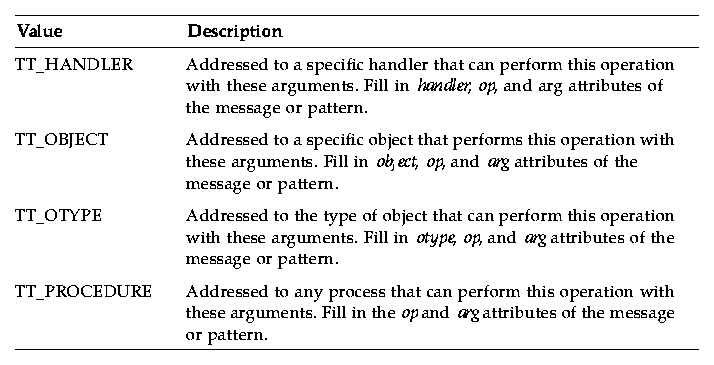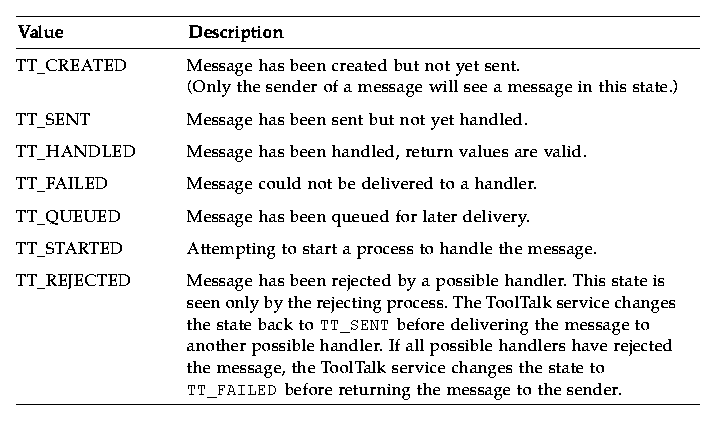




Tooltalk Reference Manual
2 The ToolTalk Enumerated Types
Contents of Chapter:
- Tt_address
-
- Tt_callback
-
- Tt_category
-
- Tt_class
-
- Tt_disposition
-
- Tt_filter
-
- Tt_mode
-
- Tt_scope
-
- Tt_state
-
- Tt_status
-
This chapter provides reference information for the enumerated types component of the ToolTalk application programming interface (API).
The ToolTalk enumerated types fall into these categories:
- Tt_address
- Tt_callback
- Tt_category
- Tt_class
- Tt_disposition
- Tt_filter
- Tt_mode
- Tt_scope
- Tt_state
- Tt_status
They are listed in alphabetical order in each section.
Tt_address indicates which message attributes form the address to which the message will be delivered. Table 2-1 describes the possible values.
Table 2-1 Possible Values for Tt_address

These values are used to specify the action taken by the callback attached to messages or patterns. If no callback returns TT_CALLBACK_PROCESSED, tt_message_receive() will return the message. Table 2-2 describes the possible values.
Table 2-2 Possible Values for Tt_callback

Tt_category
Tt_category values for the category attribute of a pattern indicate the receiver's intent. Table 2-3 describes the possible values.
Table 2-3 Possible Values for Tt_category

These values for the class attribute of a message or pattern indicate whether the sender wants an action to take place after the message has been received. Table 2-4 describes the possible values.
Table 2-4 Possible Values for Tt_class

Tt_disposition
Tt_disposition values indicate whether the receiving application should be started to receive the message or if the message should be queued until the receiving process is started at a later time. The message can also be discarded if the receiver is not started.
Note that Tt_disposition values can be added together, so that TT_QUEUE+TT_START means both to queue the message and to try to start a process. This can be useful if the start can fail (or be vetoed by the user), to ensure the message is processed as soon as an eligible process does start.
Table 2-5 describes the possible values.
Table 2-5 Possible Values for Tt_disposition

Tt_filter
Tt_filter_action is the return value from a query callback filter procedure. Table 2-6 describes the possible values.
Table 2-6 Possible Values for Tt_filter

Tt_mode
Tt_mode values specify whether the sender, handler, or observers writes a message argument. Table 2-7 describes the possible values.
Table 2-7 Possible Values for Tt_mode

Tt_scope
Tt_scope values for the Scope attribute of a message or pattern indicate the set of processes eligible to receive the message. Table 2-8 describes the possible values.
Table 2-8 Possible Values for Tt_scope

Tt_state
Tt_state values indicate a message's delivery status. Table 2-9 describes the possible values.
Table 2-9 Possible Values for Tt_state

Tt_status
A Tt_status code is returned by all functions, sometimes directly and sometimes encoded in an error return value. See the ToolTalk User's Guide for instructions on to determine whether the Tt_status code is a warning or an error and for retrieving the error message string for a Tt_status code.
Chapter 7, "ToolTalk Error Messages," lists the Tt_status codes. The following information is provided for each status code:
- Message id
- Error message string
- Description
- Solution





Generated with CERN WebMaker



















